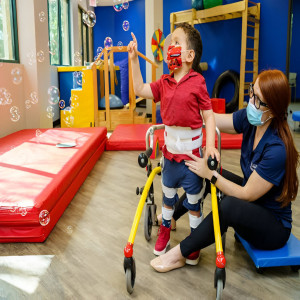Description of Occupational Therapy Course
The Bachelor of Occupational Therapy course offered by the GNSU will provide the Student Excellent exposure of the Academic by the Qualified Teachers as well as the Clinical Exposure in the Hospital and Pediatric Neuro Developmental Rehabilitation Centre present inside the GNSU Campus.
Occupational therapy (OT) is a Branch of Allied Health Care that helps People of all Ages who have Physical, Sensory, or Cognitive Problems. That involves the use of Assessment, Intervention, Consultation, and Coaching to Develop, Recover, or Maintain Meaningful Occupations of Individuals, Groups, or Communities. The field of OT consists of Allied Health Care Practitioners Trained and Educated to Support Mental Health and Physical Performance. Occupational Therapists specialize in Teaching, Educating, and Supporting Participation in Activities that Occupy an Individual's Time. It is an Independent Health Profession sometimes categorized as an Allied Health Profession and Consists of Occupational Therapists (OTs)
Common interventions include: Helping Differently abled Children to participate in Meaningful Activities at Home, School, and within the Community (Independent Mobility is often a Central Concern). Training in Assistive Device Technology, Meaningful and Purposeful Activities, and life skills. Physical Injury Rehabilitation. Mental Dysfunction Rehabilitation. Support of Individuals across the Age Spectrum Experiencing Physical and Cognitive changes. Assessing Ergonomics and Assistive Seating options to Maximize Independent function, while Alleviating the Risk of Pressure Injury. Education in the Disease and Rehabilitation Process. Advocating for Patient Health. Exploring Vocational Activities with Clients.
Occupational Therapists deal with a wide range of cases, including:
- Physical Disabilities: Spinal cord injuries, Amputations, Arthritis, and Musculoskeletal Disorders.
- Mental Health Conditions: Depression, Anxiety, Schizophrenia, Bipolar Disorder, and Substance Abuse.
- Neurological Disorders: Stroke, Traumatic Brain Injury, Parkinson's Disease, Multiple Sclerosis, and Alzheimer's Disease.
- Developmental Disorders: Autism, ADHD, Down syndrome, Intellectual Disability, Slow Learners and learning disabilities.
- Chronic Conditions: Associated problems in Diabetes, Heart Disease, and Chronic Pain Management.
- Pediatric Cases: Developmental Delays, Cerebral Palsy, and Pediatric Rehabilitation.
- Geriatric Cases: Age-related Cognitive and Physical decline, Dementia, and Elder Care.
- Sensory Processing Disorders: Sensory Integration and Processing difficulties.
- Burns and Wounds: Rehabilitation after Burns, Wounds, or Surgical Procedures.
- Vision and Hearing Impairments: Adaptive strategies for individuals with Visual or Hearing Impairments.
- Rehabilitation: Helping individuals Recover from Injuries, Illnesses, or Surgeries to Regain Independence in Daily Activities.
Eligibility Criteria:
Pass in 10 + 2 with Physics, Chemistry and Biology
Course Duration:
Occupational Therapy is a 4-year Full Time Programme and 01 year Internship
Course and Fee Details:
| Duration |
Admission Fee |
Regis. Fee |
Caution Money |
Semester Fee |
Exam Fee (Rs.) |
Misc. (Rs.) |
| 5 Years |
2,000 |
5,500 |
5,000 |
40,000 |
14,000 |
12,500 |
Syllabus for Bachelor of Occupational Therapy - (BOT)
Fee Increase Policy
From the 2nd year onwards, Annual fees will increase by a minimum of 5%






.jpg)
